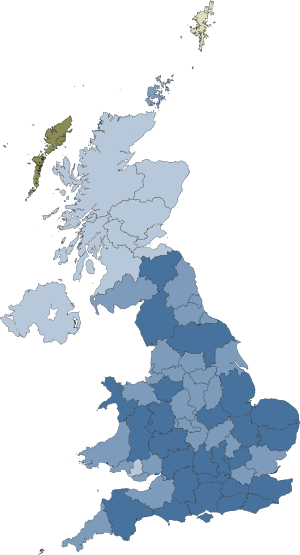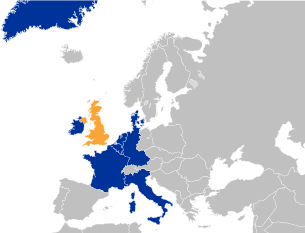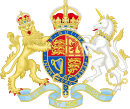 Global Information
Global Information1975 United Kingdom European Communities membership referendum information
| ||||||||||||||||||||||
| ||||||||||||||||||||||
| Results | ||||||||||||||||||||||
|---|---|---|---|---|---|---|---|---|---|---|---|---|---|---|---|---|---|---|---|---|---|---|
| ||||||||||||||||||||||
 Results by Results by local voting area Yes: 50–60% 60–70% 70-80% No: 50–60% 60–70% 70-80% | ||||||||||||||||||||||

The United Kingdom European Communities membership referendum, also known variously as the Referendum on the European Community (Common Market), the Common Market referendum and EEC membership referendum, took place under the provisions of the Referendum Act 1975 on 5 June 1975 in the United Kingdom to gauge support for the country's continued membership of the three European Communities (EC) – principally the European Economic Community (EEC, the 'Common Market'), the European Atomic Energy Community (Euratom), and the European Coal and Steel Community (ECSC). — which it had joined as a member state two-and-a-half years earlier on 1 January 1973 under the Conservative government of Edward Heath. The Labour Party's manifesto for the October 1974 general election had promised that the people would decide through the ballot box whether to remain in the EC.[1]
The electorate expressed significant support for continued EC membership, with 67% voting “Yes” in favour of the status quo on a national turnout of 64% compared with just 32% who voted “No” and because the preferred option was the also the status quo it meant that the UK Government was not required to take any further action upon receipt of the final result. In a 1975 pamphlet Prime Minister Harold Wilson said: "I ask you to use your vote. For it is your vote that will now decide. The Government will accept your verdict."[2] The pamphlet also said: "Now the time has come for you to decide. The Government will accept your decision — whichever way it goes."
This was the first national referendum ever to be held throughout the United Kingdom which until this point because of the principle of parliamentary sovereignty the notion of a referendum had been generally deemed as “unconstitutional” and due to the same principle the referendum result could not be legally binding on either the Government or Parliament, and would remain the only UK-wide referendum until the 2011 referendum on the Alternative Vote system was held thirty-six years later. It was also the only national referendum to be held on the UK's relationship with Europe until the 2016 referendum on continued EU membership.
The February 1974 general election had yielded a Labour minority government, which went on to win a very small overall majority in the October 1974 general election. Labour pledged in its February 1974 manifesto to renegotiate the terms of British accession to the EC, and then to consult the public on whether Britain should remain in the EC on the new terms, if they were acceptable to the government. The Labour Party had historically feared the consequences of EC membership, such as the large differentials between the high price of food under the Common Agricultural Policy and the low prices prevalent in Commonwealth markets, as well as the loss of both economic sovereignty and the freedom of governments to engage in socialist industrial policies, and party leaders stated their opinion that the Conservatives had negotiated unfavourable terms for Britain.[3] The EC heads of government agreed to a deal in Dublin on 11 March 1975; Wilson declared: "I believe that our renegotiation objectives have been substantially though not completely achieved", and said that the government would recommend a vote in favour of continued membership.[4] On 9 April, the House of Commons voted by 396 to 170 to continue within the Common Market on the new terms. Along with these developments, the government drafted a Referendum Bill, to be moved in case of a successful renegotiation.
The referendum debate and campaign was an unusual time in British politics and was the third national vote to be held in seventeen months. During the campaign, the Labour Cabinet was split and its members campaigned on each side of the question, an unprecedented breach of Cabinet collective responsibility. Most votes in the House of Commons in preparation for the referendum were only carried after opposition support, and the Government faced several defeats on technical issues such as the handling and format of the referendum counts.
The referendum did temporarily achieve Harold Wilson's ambition to bring the divided Labour Party together on the European issue; however, eight years later, Labour's 1983 general election manifesto pledged withdrawal from the Communities.[5] It also significantly strengthened the position of the pro-marketeer (later pro-Europe) politicians in the UK Parliament for the next thirty years, but the issue remained a contentious one and in the decades that followed, successive UK governments integrated further into the European project by ratifying subsequent European treaties (in particular Maastricht and Lisbon) and agreements but without direct consent from the British people although the UK Government did decide against adopting the Euro after the Pound was forced to withdraw from its precursor the European Exchange Rate Mechanism in 1992 what became known as Black Wednesday. Despite this, increasingly eurosceptic politicians believed that the principle of Parliamentary sovereignty was being eroded, and called for a second referendum on Britain's membership of what by now had become the European Union (EU), which resulted in a narrow majority in favour of the UK leaving the EU.
| Part of a series of articles on |
| Brexit |
|---|
 |
|
Withdrawal of the United Kingdom from the European Union Glossary of terms |
|
| Part of a series of articles on |
| UK membership of the European Union (1973–2020) |
|---|
 |
|
| Constitutional documents and events relevant to the status of the United Kingdom and its countries | ||||||||||||||||||||||||||||||||||||||||||||||||||||||||||||||||||||||||||||||||||||||||||||||||||||||||||||||||||||||||||||||||||||||||||||||||||||||||||||||||||||||||||||||||||||||||||||||||||||||||||||||||||||||||||||||||||||||||||||||||||||||||||||||
|---|---|---|---|---|---|---|---|---|---|---|---|---|---|---|---|---|---|---|---|---|---|---|---|---|---|---|---|---|---|---|---|---|---|---|---|---|---|---|---|---|---|---|---|---|---|---|---|---|---|---|---|---|---|---|---|---|---|---|---|---|---|---|---|---|---|---|---|---|---|---|---|---|---|---|---|---|---|---|---|---|---|---|---|---|---|---|---|---|---|---|---|---|---|---|---|---|---|---|---|---|---|---|---|---|---|---|---|---|---|---|---|---|---|---|---|---|---|---|---|---|---|---|---|---|---|---|---|---|---|---|---|---|---|---|---|---|---|---|---|---|---|---|---|---|---|---|---|---|---|---|---|---|---|---|---|---|---|---|---|---|---|---|---|---|---|---|---|---|---|---|---|---|---|---|---|---|---|---|---|---|---|---|---|---|---|---|---|---|---|---|---|---|---|---|---|---|---|---|---|---|---|---|---|---|---|---|---|---|---|---|---|---|---|---|---|---|---|---|---|---|---|---|---|---|---|---|---|---|---|---|---|---|---|---|---|---|---|---|---|---|---|---|---|---|---|---|---|---|---|---|---|---|---|---|
 | ||||||||||||||||||||||||||||||||||||||||||||||||||||||||||||||||||||||||||||||||||||||||||||||||||||||||||||||||||||||||||||||||||||||||||||||||||||||||||||||||||||||||||||||||||||||||||||||||||||||||||||||||||||||||||||||||||||||||||||||||||||||||||||||
|
List per year
|
||||||||||||||||||||||||||||||||||||||||||||||||||||||||||||||||||||||||||||||||||||||||||||||||||||||||||||||||||||||||||||||||||||||||||||||||||||||||||||||||||||||||||||||||||||||||||||||||||||||||||||||||||||||||||||||||||||||||||||||||||||||||||||||
| National and regional referendums held within the United Kingdom and its constituent countries | |||||||||||||||||||||||||||||||||||||||||||||
|---|---|---|---|---|---|---|---|---|---|---|---|---|---|---|---|---|---|---|---|---|---|---|---|---|---|---|---|---|---|---|---|---|---|---|---|---|---|---|---|---|---|---|---|---|---|
 | |||||||||||||||||||||||||||||||||||||||||||||
|
|||||||||||||||||||||||||||||||||||||||||||||
- ^ The Labour Party (1974). Britain will win with Labour: Labour Party manifesto, October 1974. Archived from the original on 12 February 2013. Retrieved 26 November 2009.
- ^ "1975 Referendum pamphlet". www.harvard-digital.co.uk.
- ^ Cook, Chris; Francis, Mary (1979). The first European elections: A handbook and guide. London: Macmillan Press. ISBN 978-0-333-26575-8.
- ^ "European Community". Parliamentary Debates (Hansard). House of Commons. 18 March 1975. col. 1456–1480.
- ^ "Labour Party Manifesto 1983". 1983. Archived from the original on 30 March 2015. Retrieved 15 May 2019.